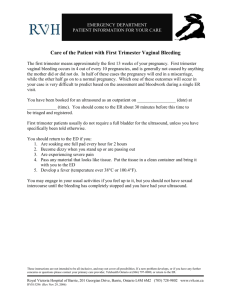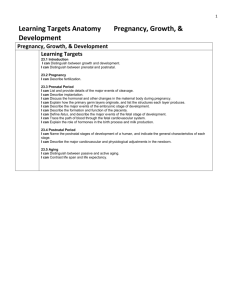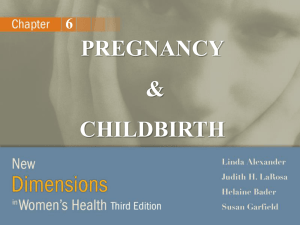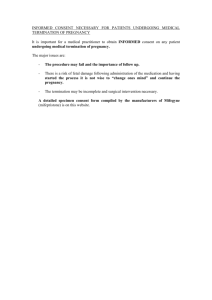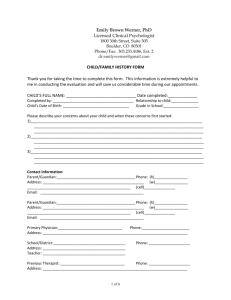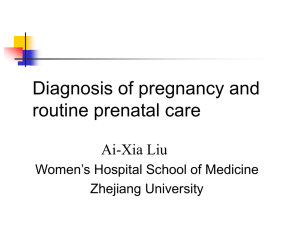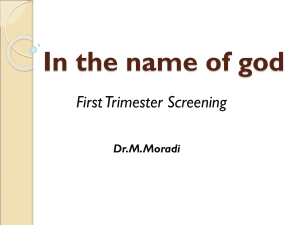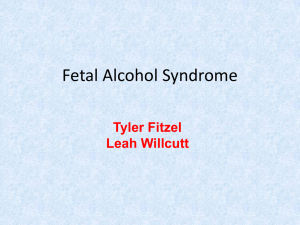GP Care in Pregnancy Guide
advertisement
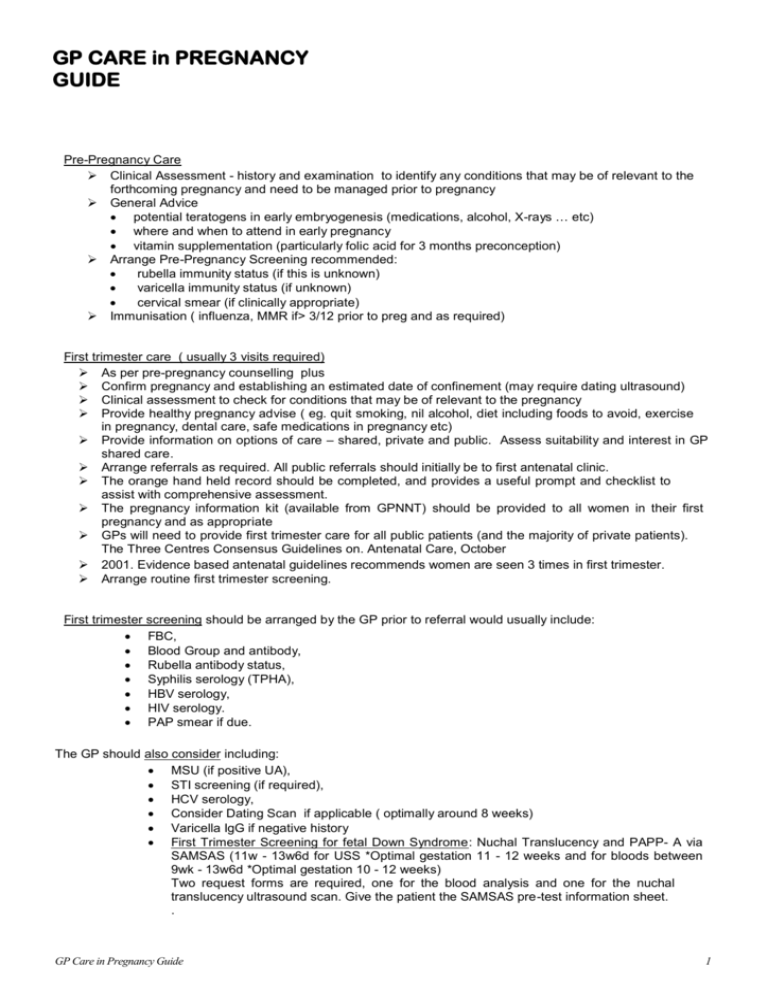
GP CARE in PREGNANCY GUIDE Pre-Pregnancy Care Clinical Assessment - history and examination to identify any conditions that may be of relevant to the forthcoming pregnancy and need to be managed prior to pregnancy General Advice potential teratogens in early embryogenesis (medications, alcohol, X-rays … etc) where and when to attend in early pregnancy vitamin supplementation (particularly folic acid for 3 months preconception) Arrange Pre-Pregnancy Screening recommended: rubella immunity status (if this is unknown) varicella immunity status (if unknown) cervical smear (if clinically appropriate) Immunisation ( influenza, MMR if> 3/12 prior to preg and as required) First trimester care ( usually 3 visits required) As per pre-pregnancy counselling plus Confirm pregnancy and establishing an estimated date of confinement (may require dating ultrasound) Clinical assessment to check for conditions that may be of relevant to the pregnancy Provide healthy pregnancy advise ( eg. quit smoking, nil alcohol, diet including foods to avoid, exercise in pregnancy, dental care, safe medications in pregnancy etc) Provide information on options of care – shared, private and public. Assess suitability and interest in GP shared care. Arrange referrals as required. All public referrals should initially be to first antenatal clinic. The orange hand held record should be completed, and provides a useful prompt and checklist to assist with comprehensive assessment. The pregnancy information kit (available from GPNNT) should be provided to all women in their first pregnancy and as appropriate GPs will need to provide first trimester care for all public patients (and the majority of private patients). The Three Centres Consensus Guidelines on. Antenatal Care, October 2001. Evidence based antenatal guidelines recommends women are seen 3 times in first trimester. Arrange routine first trimester screening. First trimester screening should be arranged by the GP prior to referral would usually include: FBC, Blood Group and antibody, Rubella antibody status, Syphilis serology (TPHA), HBV serology, HIV serology. PAP smear if due. The GP should also consider including: MSU (if positive UA), STI screening (if required), HCV serology, Consider Dating Scan if applicable ( optimally around 8 weeks) Varicella IgG if negative history First Trimester Screening for fetal Down Syndrome: Nuchal Translucency and PAPP- A via SAMSAS (11w - 13w6d for USS *Optimal gestation 11 - 12 weeks and for bloods between 9wk - 13w6d *Optimal gestation 10 - 12 weeks) Two request forms are required, one for the blood analysis and one for the nuchal translucency ultrasound scan. Give the patient the SAMSAS pre-test information sheet. . GP Care in Pregnancy Guide 1 Remember blood test is done via RDH pathology and so it is easy to tell patient to have Ultrasound scan at NT Imaging and then walk across to RDH pathology collection site in main foyer of the main hospital block at RDH for the blood test. Indicate on the XRay form that it is for nuchal translucency specifying “risk of fetal abnormality”; and "Copy to SAMSAS". The SAMSAS Patholgy Form should have patient’s medicare number recorded. SAMSAS will coordinate the results with the ultrasound practice and you will receive a single report giving the risks calculated for the pregnancy. Post-test information sheets are provided with all reports issued by SAMSAS on pregnancies found at increased risk of fetal abnormality. Please note that first trimester screening does not include detection of fetal Neural Tube Defects – see second trimester screening Screening for Haemoglobinopathies Vitamin D levels in pregnant women at risk for vitamin D deficiency Screening for CMV infection in pregnancy is currently not recommended as a routine Genetic Counselling if applicable Second trimester Care Monitor mother wellbeing, BP, etc Provide routine care including assess Fetal Growth , and refer early if problems Second trimester screening for fetal Down syndrome, Trsiomy 18 and neural tube defects = between 14w0d to 20w6d. *Optimal gestation 16 weeks. Note: if a pregnancy is screened in first trimester then any request in second trimester should be confined to a Neural Tube Defect (NTD) only screen.. Amniocentesis is available at the public hospital-performed from 15 wks GA, or consider private referral for Amniocentesis: (Referral to Dr S O’Callaghan -CVS and Amniocentesis available or Dr A Miller - Amniocentesis, note private fee would apply) Arrange fetal morphology scan at 18-20 week. Note: only change EDD is USS is >10 days different to menstrual dates 28 weeks screening includes: FBC, 50g GCT and Antibody check for RH negative women or if the woman had any atypical antibodies. (For RH positive women only check antibodies once at booking and not again at 28 or36 weeks) Antenatal prophylaxis for Prevention of Rhesus -Alloimmunisation (Anti-D) should be given at 28 and 34 weeks to all women who are Rh(D) negativeand who have not already produced anti D antibodies. See Guideline for how to access anti-D. Third Trimester Care Monitor mother wellbeing, BP, etc Provide routine care including assess Fetal Growth , presentation etc and refer early if problems Advise on signs of labour and when to attend to delivery suite Give breast feeding advise Give anti- D at 34 weeks as per protocol to Rh neg women 36 weeks screening includes ( usually done at RDH) FBC Antibody check for RH negative women or if the woman had any atypical antibodies. (For RH positive women only check once at booking) GBS screening- low vaginal swab Refer back to RDH for assessment at 36-37 weeks Post- natal Care 1. Review birth summary from RDH 2. Assess mother Breast feeding management and refer if problems PAP smear /HPV screening if due Abdo, perineum and pelvic floor health Contraception Recheck BP/BSL etc as required Maternal mental health and supports 3. Assess Baby -6 week assessment and reminders re 8 week immunisation GP Care in Pregnancy Guide 2

